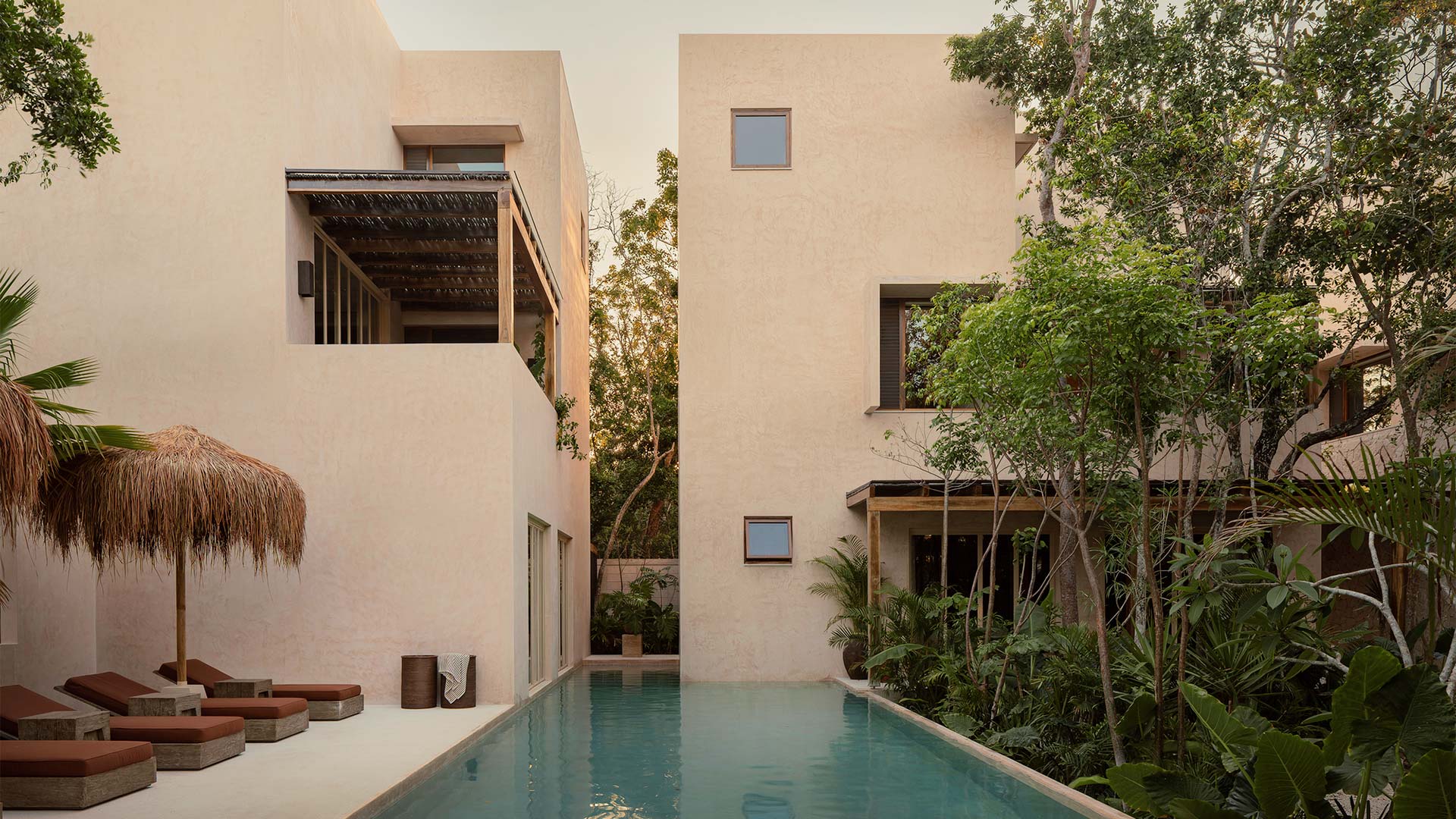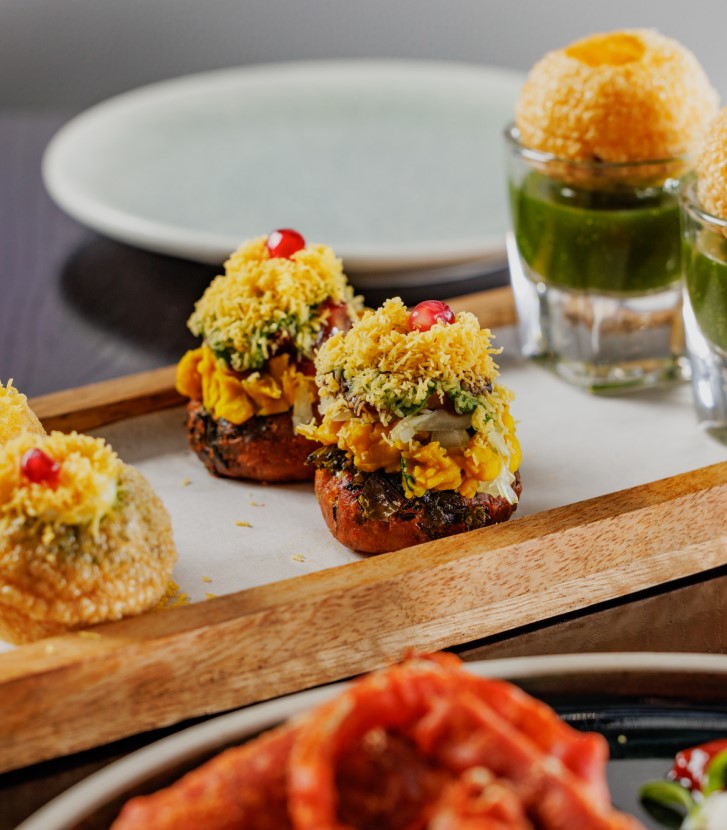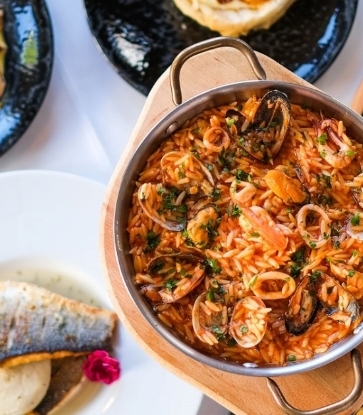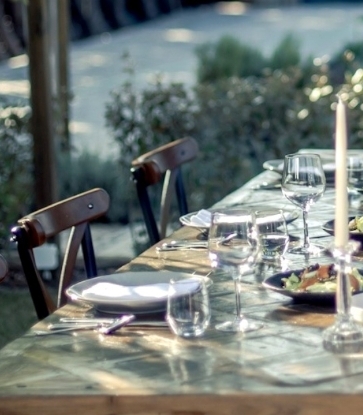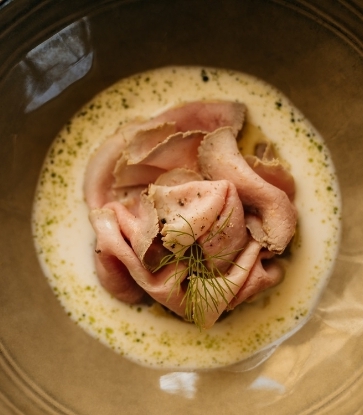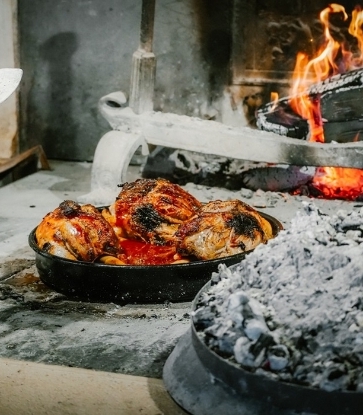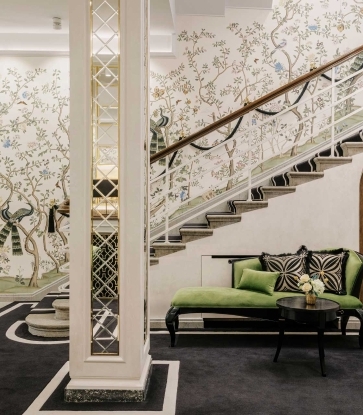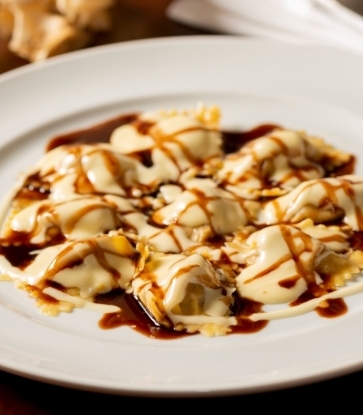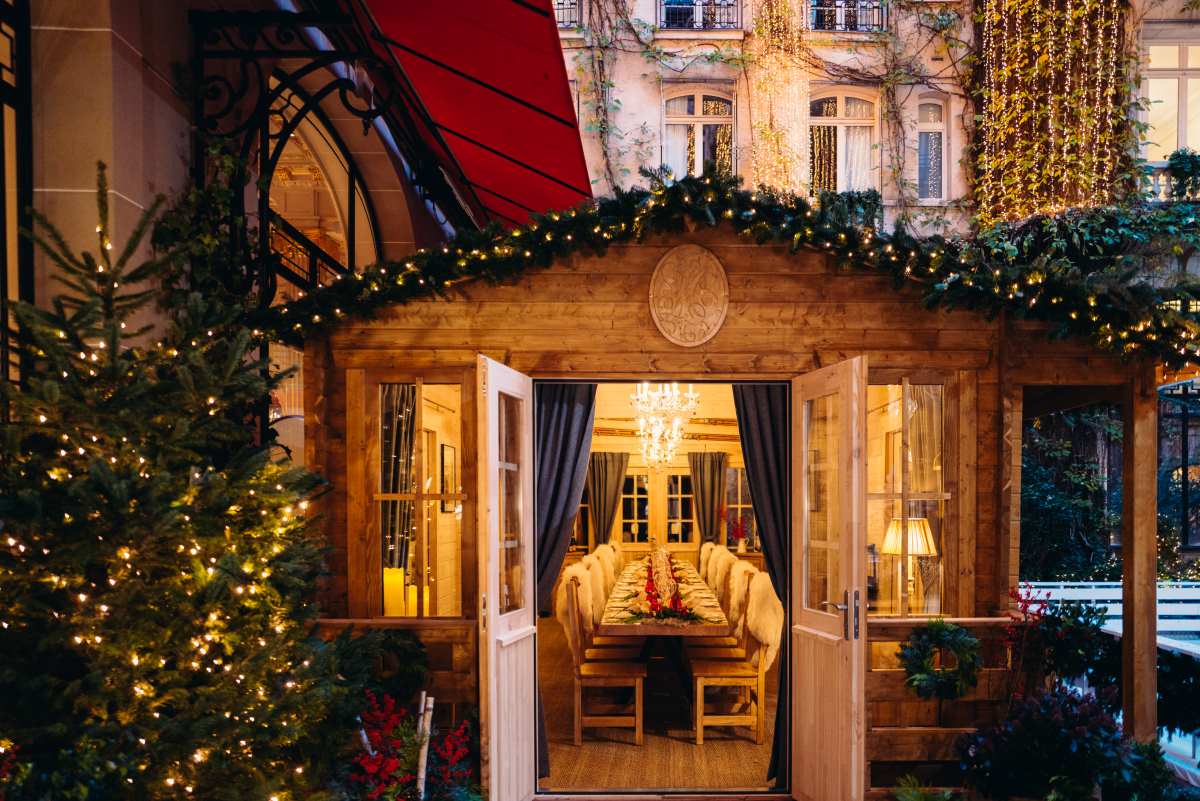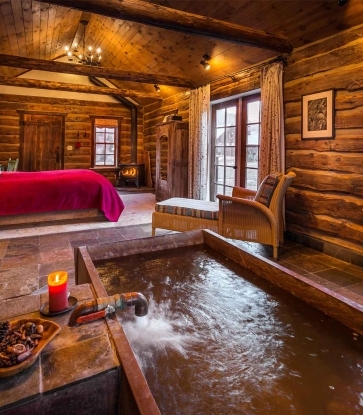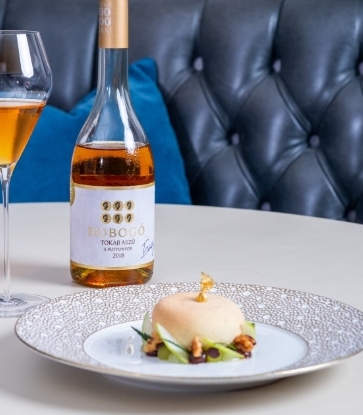Find your hotel
In Pigalle, a Right-Bank quartier at the crossroads of the 9th and 18th arrondissements down the hill from Montmartre in northern Paris, sunrise is when the area jumps into action. While bakeries like The French Bastards pump their buttery aroma into the air, just a few steps down the street, patrons file out of Pigalle Country Club, a grungy late-night bar.
“If you’re [in Pigalle] in the early morning, you’ll see people coming in from a long night out, refueling with breakfast. That’s genuinely part of the sexy, edgy charm of Pigalle,” says Chef Gregory Marchand of Frenchie restaurant, who chose the historically bohemian neighborhood for an outpost of his MICHELIN-Starred restaurant in Paris' 2nd district. With the nightlife winding down and the sun rising over the white-domed Sacré-Cœur Basilica, the romantic pull of Pigalle becomes clear.

Pigalle, named after the 18th-century sculptor Jean-Baptiste Pigalle whose work can be viewed at the Louvre, has long drawn creatives to its maze of narrow streets. André Breton, father of Surrealism, had a tiny apartment on Rue Pierre Fontaine. Henri Toulouse-Lautrec, painter of the iconic Moulin Rouge-La Goulue poster, was also a resident artist.
Dancer and singer Josephine Baker captivated nightclub audiences here, and a decade later, an unknown singer named Edith Gassion (later Edith Piaf) took to the same stages. Between the Belle Epoque cabaret spots that would become institutions—Madame Arthur, La Nouvelle Eve, Le Chat Noir, and of course, the Moulin Rouge—and the many bars d’hôtesses or hostess bars, where male patrons could find various forms of companionship, Pigalle belonged to the night owls.

However, 2006 marked a shift for Pigalle, as gentrification was set in motion when young entrepreneurs caught wind of the low real estate prices. Organic food stores displaced sex shops. Brunching replaced less savory activities. Virtue displaced vice. Some have decried the hipsterization of Pigalle—you can’t swing an APC demi-lune handbag on Rue Condorcet without hitting a bobo (bourgeois bohemian) 30-something, typically with a stroller in tow. Still, the area's independent entrepreneurs care deeply about preserving the soul of Pigalle, both the gritty and the glam.
They just also want to offer customers carefully crafted cocktails, curated selections of vintage garments and modern bistro dishes with a solid selection of natty wines. The 9th and 18th districts have become among the most desirable postcodes in Paris not just because people want to soak in the debaucherous nightlife—though that is part of it. It’s also a neighborhood where you can wake up and sweat through an infrared yoga class or meet friends for a healthy-ish brunch or top-notch dinner. It’s a little village in a big city, where you can find a sense of community.

Today, Pigalle’s charm lies in its contrasts—it’s where the pleasant, tree-lined, pedestrian path that cuts down Boulevard Clichy is flanked by rows of neon-lit peep shows and sex shops vending Eiffel Tower replicas that are more than just mementos. For however long you’re planning on staying in Pigalle, here are The MICHELIN Guide’s recommendations for where to eat and drink, what to do, and where to rest at the end of the night—be it an early or a late one.

Where to Eat and Drink
While the number of neo-bistros per square meter doesn’t match that of the hip and happening 11th district, the restaurant scene in Pigalle is sustainably scaling. Options are plentiful, from casual eats like smash burgers via the takeaway window at Dumbo and tacos with house made corn tortillas at the small but mighty kitchen at El Nopal Taquería to the compelling shared plates at Frenchie Pigalle and heart-warming dishes at Perception. “Our cuisine is always vibrant and adventurous, grounded in French terroir while drawing inspiration from multicultural influences,” says Chef Marchand. The dinner menu is bold, with plates like sweetbread “nuggets” with raw cream and herring roe. The brunch menu is familiar—Bloody Marys and Eggs Benedict.

At Perception on Rue Blanche, Chef Sukwon Yong’s lunch and four-, six-, or eight-course dinner menus combine refined, neo-bistro style cooking with Korean touches—dishes like ponzu-marinated mackerel with Granny Smith apple, pickled red onions, and a tofu gazpacho, or almond cream, yuzu compote, and mint jelly.
At Adami, a modern trattoria, napoletano chef Alfredo Sartore serves tasty, delicate first courses like crisp, paper-thin potatoes, Borlotti beans, and Osciètre caviar, followed by fresh pastas adorned with seasonal ingredients, like autumnal ricotta gnocchi with black trumpet mushrooms and pecorino cream. Le Pantruche offers a fine example of contemporary Parisian bistronomie, with dishes like tender quail stuffed with herbs and lemons served with dried fruit semolina and an herb salad, or goat cheese ravioli, with shaved fennel, pickled figs, and a tarragon emulsion. And being in The MICHELIN Guide Bib Gourmand selection, it's particularly well-priced.

In recent years, Pigalle has welcomed a handful of modern bakeries, like the Levantine bakery Babka Zana, selling hand-rolled rugelach and babka with flavors like almond praline folded into the twists. At the cult-worthy Mamiche, where an ever-present line snakes down the road, locals cue for hearty sourdough loaves while tourists wait for their Instagram moment with a warm, Valrhona dark chocolate cookie sprinkled with flaky sea salt.

When the artisanal wave swept through Pigalle, the cocktail scene was not untouched—and that’s a good thing. The neighborhood has become a veritable hub for drinks mixed with high-quality spirits. When co-owners Joseph Boley and Jen Riley opened Sister Midnight in 2019, they envisioned a high-caliber craft cocktail bar that doubled as a drag performance space. The location on Rue Viollet-le-Duc, a sliver of a street off gritty Boulevard Rochechouart, made perfect sense.

“For us, Pigalle was synonymous with entertainment, nightlife (in all its embodiments), and counterculture for over 150 years,” explains Riley. “We had a number of friends searching for genuinely welcoming venues to perform both drag and queer burlesque and with Pigalle having a significant history of drag and transgender cabaret, it seemed like the smart idea.” At Sister, as regularly lovingly call it, the atmosphere is inclusive, the performances are intimate, and the cocktails are top-shelf—their dirty martini is among the best in Paris.
Nearby at Classique, a cocktail bar inside a former pharmacy, patrons pick their poison from a menu specializing in low-ABV beverages, like a Savagnin Martini with Sake Bijito, Manzanilla, and Dolin Dry Vermouth, and serious small plates to go with, like thin-sliced, paprika-laced jamón Ibérico topped with fatted capers and good olive oil. A quick stroll away on the leafy Avenue Trudaine, Minore chef Katsuaki Okiyama, formerly of the MICHELIN-Starred Abri, teamed up with Hugo Combe (of Classique) to roll out a restaurant and cocktail bar where the drinks and dishes are as thoughtful as the lights are flatteringly dimmed.
Around the corner, you’ll find Le Vin au Vert, a cozy wine bar specializing in biodynamic and natural wines. There, the staff stands ready to make bottle suggestions, or you can sit at one of the rustic wooden tables for a glass with charcuterie and cheese.

Where to Stay
In recent years, boutique and luxury hotel openings have captured the spirit of today’s Pigalle—paying tribute to the area’s soul while catering to modern bohemian-bourgeois tastes. Originally opened in 1929 as The Charleston, Hotel Rochechouart reopened under the Orso brand in 2022 after a complete renovation led by the Paris-based dream team design duo, Festen Architecture, who maintained original features like the Art Deco staircase and the blue-tiled mosaics. The onsite nightclub Le Mikado, once frequented by music legends like Josephine Baker and Johnny Hallyday, was also revived in 2022. Seasonally, views from the rooftop bar offer unparalleled 360-degree views of Paris. Drink a Noam Blonde or a Lutèce Tonic while you play “spot the Parisian landmark”— the Sacré Coeur, the Pantheon, the Eiffel Tower and more.
On Rue de Bruxelles, just across the boulevard from the Moulin Rouge, you’ll find Maison Souquet. The sumptuous property channels 19th-century pleasure houses—luxe hideaways with gardens, salons, and private rooms where guests could socialize and take in a variety of performances. The cocktail bar blends a speakeasy’s intimacy with a Belle Époque aesthetic. With moody lighting, draped in plush red velvet, the space feels like a seductive wink to the neighborhood’s past. The hotel’s spa (a rarity in Pigalle) has a ten-meter pool, hammam, and treatment room—everything you need to purge any impurities.

It’s fitting that Le Pigalle bills itself as “un hotel de quartier,” or neighborhood hotel. The hotel taps local artisans and creatives for everything from the crusty bread in the lobby restaurant to the original photography adorning bedroom walls. Steps from Folies Pigalle nightclub, the property channels the glam, rock and roll vibe of its environs. Each of the 40 rooms is uniquely decorated, with flea market furniture gems and vintage art, plus modern comforts like claw-foot tubs and specially made toiletries from Le Labo.
Just down the sloping street, you’ll find Grand Pigalle, a luxury boutique hotel from the Experimental Group, best-known for turning the Paris cocktail culture on its head in the early 2000s. Located in a classic Haussmannian building, the property’s 37 rooms blend contemporary interiors by popular French designer Dorothée Meilichzon with romantic touches—gold accents, private wrought-iron balconies with views of the mansard rooftops of Montmartre, and spacious tubs begging for a soak session. Guests can easily book a meal at Chef Gregory Marchand’s onsite restaurant, Frenchie Pigalle.

Steps away, when Hoy opened on the bustling Rue des Martyrs, it added something special to Pigalle: a wellness space where visitors can hand-select dried flower bouquets or tuck into plant-based meals at the onsite restaurant, or detox in an infrared yoga class, and, of course, get a good night’s rest in one of the 21 rooms, with mid-century decor and earthy hues and even in-room ballet bars for stretching.
Founder Charlotte Gomez de Orozco, whose grandparents lived on Rue Lepic, a five-minute walk away in Montmartre, had a special place in her heart for Pigalle and knew she wanted to open her hotel here. “What I find unique about Pigalle today is its transformation—it’s now a vibrant, youthful area full of creativity and energy. You can feel this pulse of life from the new cafés, shops, and bars that cater to a younger crowd, especially those in their thirties who are really beginning to establish their lives here,” says Gomez de Orozco. “[Pigalle is] where I live, where I feel connected, and it seemed natural to create a space that aligns with the neighborhood’s evolution—balancing tradition with a fresh, holistic concept of living.”

What to Do
Despite its evolution, Pigalle remains a hub of after-dark entertainment, offering endless options for cabaret, burlesque, and drag performances—from iconic venues like Chez Michou, Madame Arthur and the Moulin Rouge, to intimate bars with smaller (or non-existent) stages, such as Sister Midnight and Le Cancan.
Walking along the Boulevard Marguerite de Rochechouart, the heart of Pigalle, you can’t miss the all-white facade with porthole windows and bold red lettering of La Cigale. Opened in 1887, La Cigale is one of the most storied Parisian performance and cabaret venues. Today, the space welcomes a wide range of performances, from American songstress Lucinda Williams to South Korean indie musicians Wave to Earth.
However, while Pigalle is a go-to for music, it’s a little thin on the ground for art. “Galleries are few and far between. But there are a few great museums, most notably Musée Gustave Moreau, which is one of my favorites,” explains Alexandra Weinress, founder of bespoke art concierge service, TheSeen. Housed in the namesake artist’s former home, the museum offers a glimpse into the life and work of symbolist painter Gustave Moreau, featuring his art, personal belongings, and preserved studio spaces.

Vintage hunters will find plenty of treasures in Pigalle. Merguiller is a petite shop specializing in clothing and accessories from the turn of the 20th century to the 1980s, all available for purchase or lease. Here, you’ll not infrequently see celebrities browsing for event looks and fashion directors scouting for shoot garments. “I chose South Pigalle for its authenticity and warmth,” says Merguiller founder and stylist Tania Claire. “This area is historically vibrant. From the 19th century, the neighborhood has had a creative artistic link with its legendary cabarets like the Moulin Rouge and painters like Toulouse-Lautrec. It’s an original and international neighborhood where the spirit of Edith Piaf lives on.”
On rue Victor Massé, Iregular has a careful selection of contemporary and vintage high-end designer pieces, from last season’s must-have Prada handbag to the early aughts Jean Paul Gaultier knit you never knew you always needed.Clients after a particular item can also make special requests by appointment. On Rue Louise-Émilie de la tour d’Auvergne, you’ll find Ikonik, a consignment store and vintage shop where the immaculately cared-for second-hand clothes are organized by color. The unique selling point is the thoughtful curation—be it a gently worn Zara vest or a pristine Courrèges vinyl jacket, all of the pieces feel current and Parisian chic.
Address book:
Hotels
Maison Souquet - 10 rue de Bruxelles, 75009
Hoy - 68 rue des Martyrs, 75009
Grande Pigalle - 29 rue Victor Massé, 75009
Le Pigalle - 9 rue Frochot, 75009
Hotel Rochechouart - 55 Blvd Marguerite de Rochechouart, 75009
Restaurants
Frenchie Pigalle - 29 rue Victor Massé, 75009
Perception - 53 rue Blanche, 75009
Adami - 19bis Rue Pierre Fontaine, 75009, Paris, France
Le Pantruche - 3 rue Victor Massé, 75009
Bakeries
Babka Zana - 65 rue Condorcet, 75009
Mamiche - 45 rue Condorcet, 75009
Bars
Sister Midnight - 4 rue Viollet-le-Duc, 75009
Classique -1bis rue Lallier, 75009
Minore - 4 Avenue Trudaine, 75009 Paris
Le Vin au Vert - 70 rue de Dunkerque, 75009
Cabarets
Madame Arthur - 75bis rue des Martyrs, 75018
Chez Michou - 80 rue des Martyrs, 75018
La Nouvelle Eve - 25 rue Pierre Font, 75009
Music Venues
Le Cigale - 120 Blvd Marguerite de Rochechouart, 75018
Elysée Montmartre - 72 Boulevard de Rochechouart, 75018
La Boule Noire - 120 Boulevard de Rochechouart, 75018
Shops
Merguiller - 57 rue Rochechouart, 75009 Paris
Iregular - 16 rue Victor Massé, 75009
Ikonik - 40 rue Louise-Émilie de la Tour d'Auvergne, 75009
Related articles:




